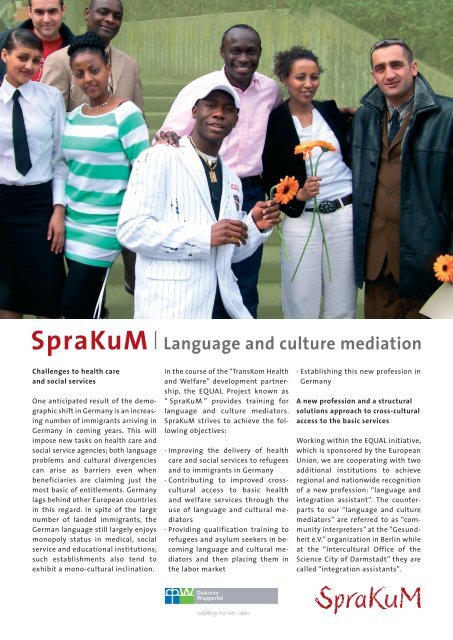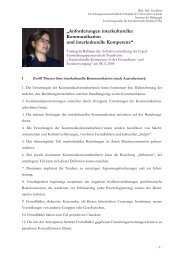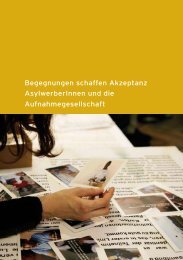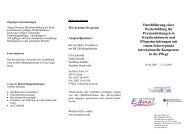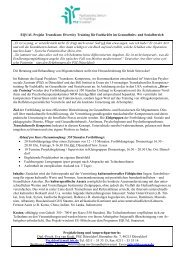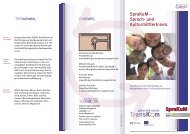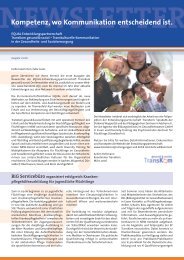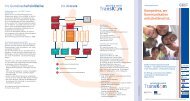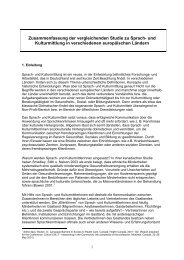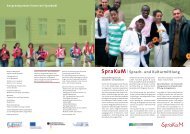SpraKuM | Language and culture mediation - Transkom
SpraKuM | Language and culture mediation - Transkom
SpraKuM | Language and culture mediation - Transkom
- No tags were found...
You also want an ePaper? Increase the reach of your titles
YUMPU automatically turns print PDFs into web optimized ePapers that Google loves.
Career qualification at <strong>SpraKuM</strong><strong>Language</strong> <strong>and</strong> <strong>culture</strong> mediators:These professionals provide languageinterpreting <strong>and</strong> cultural <strong>mediation</strong>parallel to the home <strong>culture</strong> forforeign patients or clients. Thepurpose is to avoid cross-culturalmisunderst<strong>and</strong>ings between theclients <strong>and</strong> the institutions taskedwith providing basic services.Participants are strengthenedthrough continuous promotion oftheir sense of self-worth <strong>and</strong>empowerment. This is reflectedin a wide variety of culturalactivities that the parti cipantscontribute to the project’s workinggroups, which augment classroominstruction.In the meantime the language <strong>and</strong><strong>culture</strong> mediators at <strong>SpraKuM</strong>can provide support in 60 languages<strong>and</strong> dialects from Africa, Asia,eastern Europe <strong>and</strong> the Near <strong>and</strong>Middle East.The qualification concept<strong>and</strong> its modulesQualification as a language <strong>and</strong> <strong>culture</strong>mediator builds on the results ofthe first project cycle. Qualificationtraining lasts 2 1 / 2 years, divided intoa 1 1 / 2 -year theoretical phase <strong>and</strong> aone - year professional orientationphase carried out in the form of practica.The theoretical phase is subdividedinto three 6-month modules,each of which represents a com pleteinstructional unit.In the first module the emphasisis on perfecting the participants’comm<strong>and</strong> of the German languagewhile they also reflect on their ownimmigration experiences. The purposeof the second module is totrain participants for interpretingtasks in the health care <strong>and</strong> socialservices settings, taking account oflinguistic, intercultural <strong>and</strong> technicalaspects. An important factoris mediating with a sensitivity forthe cultural differences betweenthe patient or client <strong>and</strong> the institutionswhich deliver basic services.Taught in addition are thefundamental methods for crossculturalcommunication, <strong>mediation</strong><strong>and</strong> conflict management; professionalethics requirements such asconfidentiality <strong>and</strong> impartiality aredealt with. There follows in thethird module more specialized instruction<strong>and</strong> professionalization inthe specific fields of health care<strong>and</strong> social welfare.The participants are awarded subcertificatesas each module is concluded.Qualification culminates ina final certificate authenticated bythe Hamburg-Eppendorf UniversityHospital.Auxiliary qualificationcertificates at <strong>SpraKuM</strong>Project participants can acquire additional,internationally recognizedcertificates <strong>and</strong> thus improve theirprospects on the labor markets in boththeir home country <strong>and</strong> in Germany:· First German language certificate,issued by the Goethe Institute· Central intermediate examination,administered by the Goethe Institute· “Xpert” European computer passport· Youth trainer certificate(at <strong>SpraKuM</strong> Aachen)The high qualification levels that projectparticipants achieve pave the roadto successful integration once theirpetitions for asylum are approved.
Career practice among the traineesWeselKevelaerGelsenkirchenBönenOberhausenDuisburgBochumKrefeldViersenKaarstMönchengladbachRatingenWuppertalErkrathEnnepetalBreckerfeldNeussRemscheidGeilenkirchen DormagenMonheimGangelt LinnichJülichBaesweilerKölnHerzogenrathDürenAachen StolbergAlfterBonnWürselenCooperating municipalitiesin North-Rhine Westphalia:<strong>SpraKuM</strong> in Aachen<strong>SpraKuM</strong> in Wuppertal195168Following the firsttraining cycle19 persons, or 70%of the 27 personscompleting the course,were able to findemployment.2102Of those participantswho found work, theiremployment situationwasFull-time: 5 / 26%Part-time: 2 / 10.5%Contractemployment: 10 / 53%Casual labor: 2 / 10.5%326The qualified participantsare working· As language <strong>and</strong> <strong>culture</strong>mediators: 16 / 59.3%· In other careers: 3 / 11.1%Of the 8 participants(8 / 29.6%) who could notbe placed, 2 (2 / 7.4%) aredoing volunteer workMunicipalities in North-Rhine Westphaliaparticipating in <strong>SpraKuM</strong>Refugees’ taking part in the <strong>SpraKuM</strong>project is made possible by the participatingmunicipalities as they offsetthe costs against the entitlementsprescribed in the Asylum Seek ers’Benefits Act or in Volume III of theSocial Welfare Code; disbursementsare in the form of co-financing <strong>and</strong>remuneration of the daily expensesfor travel to the training sites.Cooperation has been establishedwith the following municipalities inNorth-Rhine Westphalia:Aachen, Alfter, Baesweiler,Bochum, Bönen, Bonn, Breckerfeld,Cologne, Duisburg, Dormagen,Düren, Ennepetal, Erkrath, Gangelt,Geilenkirchen, Gelsenkirchen,Herzogenrath, Jülich, Kaarst,Kevelaer, Krefeld, Linnich,Mönchengladbach, Monheim,Neuss, Oberhausen, Ratingen,Remscheid, Stolberg, Viersen,Würselen, Wesel <strong>and</strong> Wuppertal.Employment <strong>and</strong> deployment oflanguage <strong>and</strong> <strong>culture</strong> mediatorsThe experiences from the first trainingcycle show that the use of language <strong>and</strong><strong>culture</strong> mediators in health care <strong>and</strong>social services facilities helps fosterthe integration of asylum seekers intothe labor market without lesseningemployment opportunities for groupsenjoying priority in placement. Makinguse of linguistic <strong>and</strong> cultural potentialsalready on h<strong>and</strong> makes forefficient support of assistance seekerswho speak a foreign language.Errors resulting from misunderst<strong>and</strong>ingscan be avoided <strong>and</strong> protractedcommunications processes can beabbreviated considerably.The results of the <strong>SpraKuM</strong> programare evaluated by the Hamburg-Eppendorf University Hospital <strong>and</strong>by the Integration Ministry of theState of North-Rhine Westphalia.Among the institutions that make useof language <strong>and</strong> <strong>culture</strong> mediatorsare hospitals, public health offices,psychotherapeutic facilities, psychiatricpractices, all kinds of advisoryagencies, youth welfare offices, socialservices offices, welfare agencies etc.To date it has been possible to place70 per cent of the qualified language<strong>and</strong> <strong>culture</strong> mediators in the pri mary<strong>and</strong> secondary labor markets.More than 200 facilities involved indelivering basic social services inNorth-Rhine Westphalia regularlyavail themselves of services by language<strong>and</strong> <strong>culture</strong> mediators.
Contacts at <strong>SpraKuM</strong>Photography: EQUAL Projekt <strong>SpraKuM</strong>Design: Stephan Preuss Grafik + DesignDiakonie WuppertalEQUAL Project <strong>SpraKuM</strong>Ludwigstrasse 2242105 WuppertalPhone: +49 / 202 / 49 69 70Fax: +49 / 202 / 45 31 44Project management/coordination:Varinia MoralesProject associate:Melanie AssauerCo-workers:Cigdem Akinci <strong>and</strong> Birgit NaujoksAdministration:Nicole RossiAccounting:Simona Schröder <strong>and</strong> Anja Schüttermorales@migrationsdienst-wuppertal.deassauer@migrationsdienst-wuppertal.deThe objectives of the “TransKomHealth <strong>and</strong> Welfare” developmentpartnership are, firstly, to try outnew concepts for professionalqualification of refugees <strong>and</strong>,secondly, to improve interculturalcommunications in both the healthcare field <strong>and</strong> in welfare agencies.TransKom’s operativepartners include:· Practicum Year at the CharitableServices Agency of the ProtestantChurch in Rhinel<strong>and</strong>· Pedagogic Center in Aachen(Pädagogisches Zentrum Aachen e. V.)· Charitable Services Agencyin Wuppertal· PSZ Psychosocial Center forRefugees in Düsseldorf· Ministry of Integration of theState of North-Rhine Westphalia· University Hospital atHamburg-Eppendorf· BiG Health Care Education Institute(Bildungsinstitut im GesundheitswesengGmbH), Essen· Medikon GmbH, Oberhausenwww.transkom.infowww.sprakum.de


